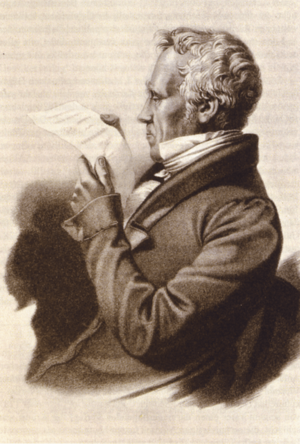Zollverein facts for kids
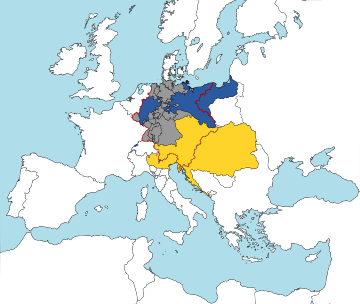
- Prussia in 1834
- Areas included until 1866
- Austrian possessions outside the Zollverein
-
Borders of the 1828 German Confederation
The Zollverein (German: [ˈtsɔlfɛɐ̯ˌʔaɪn]), also known as the German Customs Union, was a group of German states. They joined together to manage tariffs (taxes on goods) and economic policies in their lands. It officially began on 1 January 1834.
The idea for the Zollverein started much earlier, around 1818. By 1866, most German states were part of it. The Zollverein was separate from the German Confederation (1815-1866).
This was the first time in history that independent states formed a full economic union. They did this without also creating a political federation or union.
Prussia was the main force behind creating this customs union. Austria was not included. This was because Austria had very high taxes on imports. Also, Austria did not want to split its customs areas.
By 1867, the Zollverein covered about 425,000 square kilometers (164,000 sq mi). It also had trade agreements with countries like Sweden–Norway. After the German Empire was formed in 1871, the Empire took control of the union. However, not all states within the Empire joined until 1888. For example, Hamburg joined later. On the other hand, Luxembourg was an independent country. It stayed in the Zollverein until 1919.
Contents
Why the Zollverein Was Needed
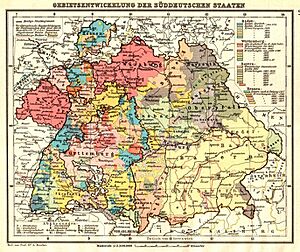
For many years, Germany was divided into many small territories and states. By the 1790s, there were about 1800 different customs borders. This was in the German-speaking Holy Roman Empire.
Even within Prussia, there were over 67 local customs and tariffs in the early 1800s. Imagine traveling from Königsberg to Cologne. A shipment would be checked and taxed about 80 times! Each check slowed down trade. Each tax made goods more expensive. This made it very hard for businesses to trade.
After France defeated a group of European forces, many small German states were combined. This happened in 1803. This event changed the map of Central Europe. Many church-owned lands became state-owned. Many free cities and small areas were taken over by larger neighbors. When the Holy Roman Empire ended in 1806, most tiny states were joined with bigger ones.
Historians believe Prussia had three main goals for the Zollverein. First, it wanted to reduce Austria's power in Germany. Second, it aimed to improve the economy. Third, it wanted to make Germany stronger against possible French attacks. It also aimed to reduce how much smaller states depended on their own economies.
The Zollverein created a bigger market for German farm products and handmade goods. It helped unite the economy. It aimed to remove trade barriers between member states. But it kept high taxes on goods from outside the union.
One economic historian, Florian Ploeckl, says Prussia wanted the Zollverein to save money. It was cheaper to manage customs for a large area than for many small ones.
Early Attempts at One System
During the time of Napoleon, there were attempts to unite the economy in the Rhineland. Napoleon wanted to stop trade with Britain. He hoped this would hurt Britain's economy. But this plan, called the Continental System, hurt Central Europe's economy instead.
Trade stopped, and markets for raw materials and finished goods disappeared. This was especially bad for trading areas like the Rhineland. They relied on imports and exports. The many taxes and tolls made things even worse. Smaller states almost went bankrupt.
After the Napoleonic Wars, European leaders met at the Congress of Vienna in 1814-1815. They redrew the map of Europe. German-speaking Europe remained mostly under Austrian influence. Prussia was also important. The German states remained independent. But the old German parliament became a Confederation Diet in Frankfurt. Austria's emperors led this group.
Some people wanted to get rid of all internal tolls. They also wanted a single German tax on imports. But the Congress of Vienna did not create economic unity. It said trade issues would be discussed later.
Challenges of Unifying Customs
Prussia and the central and southwestern states led the way in modernizing the toll system. These included Hesse-Kassel, Hesse-Darmstadt, Württemberg, Baden, and Bavaria.
Prussia learned from Napoleon's efforts to remove customs barriers. In 1818, Prussia removed its own internal customs barriers. Goods could move freely within Prussia. But goods entering or leaving Prussia faced high taxes. This made Prussia's system simple and effective. Manufactured goods, especially textiles, were heavily taxed. Food and luxury items also had important taxes.
In the southwest German states, new territories needed to be added to existing economic systems. The growth of states like Hesse, Baden, and Württemberg split Prussia's land. Prussia was no longer one continuous area. Other states' new lands separated parts of Prussia. These states often felt that Prussia was trying to expand too much. They did not like Prussia's power.
These problems got worse after the Napoleonic Wars. There was high unemployment and high prices, especially for food. Britain's economic problems also affected German states. Britain limited grain imports with its Corn Laws. This hurt German farmers, especially in eastern Prussia. It limited how much grain they could sell to Britain.
Bavaria tried to reform trade in 1856. This led to the General German Commercial Code in 1861. Many states quickly approved it. It was very successful in reducing barriers and increasing trade.
The 1820s and 1830s: Zollverein Grows
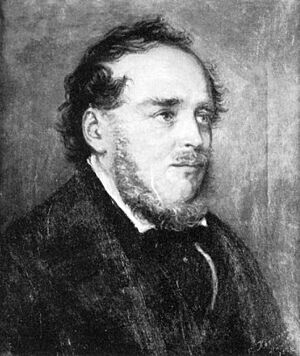
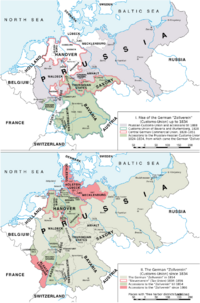
After the Napoleonic Wars, Germany had 39 states, including four city-states. Prussia removed its own internal tariffs in 1818. Then, it started inviting other states to do the same. These agreements formed the basis for the Zollverein. It created strong economic ties between Prussian and Hohenzollern lands. It also connected parts of the Hohenzollern family's lands that were not next to each other.
The Zollverein was created to remove obstacles to trade and growth. These obstacles included different weights and measures in German states. It aimed to create economic unity when Germany was politically divided.
It was hard to get rid of internal customs. States relied on these customs for most of their income. But outside forces helped solve this problem. When Napoleon's trade system ended, German traders faced direct competition from English industries. A united German Trade and Tradesmen's Union demanded protection from English goods.
Their spokesperson, economist Friedrich List, worried that Germans would become "drawers of water and hewers of wood for Britain." Another person, Karl Friedrich Nebenius, described the problems of so many borders:
The 38 toll barriers in Germany cripple domestic traffic. It's like if every part of the human body were tied up, so blood couldn't flow. To trade from Hamburg to Austria, one must go through the rules of ten states. You study ten tolls, pass ten barriers, and pay tolls ten times. Who but the unlucky has to deal with such borders? To live with such borders? Where three or four states meet, one must live his whole life with bad, senseless tolls. That is not a Fatherland!
In 1820, Württemberg planned a customs union for the "middle-sized" German states. These included itself, Baden, Bavaria, and the two Hessian states. This union would not include Austria or Prussia. The plans failed because the states had different interests.
However, in 1825, Württemberg and Bavaria formed the South German Customs Union. Other states like Hanover and Saxony made their own trade agreements. They promised not to join Prussia's union. But their union did not fix the problems caused by toll barriers.
In 1834, Baden and Württemberg joined the Prussian union. It was then renamed the German Customs Union. By 1835, the German Customs Union had grown. It included most states of the German Confederation. This included Saxony, the Thuringian states, Württemberg, Baden, Bavaria, and the Hessian states. It removed many internal customs barriers. But it kept high taxes on foreign goods.
Timeline of the Zollverein
| Date | Event(s) |
|---|---|
| 1815 | The German Confederation is formed. Economic and customs issues are left for later talks. |
| 1818 | Prussia creates an internal customs union for its own state and Hohenzollern lands. |
| 1819 | Baden suggests a customs union through the German Confederation. The idea fails. |
| 1821 | Duchy of Anhalt joins the Prussian customs system. |
| 1826 | Mecklenburg-Schwerin joins the Prussian Customs Union. |
| 1828 | Bavaria and Württemberg form the South German Customs Union (SGCU). |
| 1828 | Prussia and the Grand Duchy of Hesse (Hesse-Darmstadt) form the Prussian-Hessian Customs Union (PHCU). |
| 1828 | The Central German Commercial Union (CGCU) is formed by central and northern German states. |
| 1829 | A trade alliance is formed between the SGCU and PHCU. |
| 1831 | Hesse-Kassel and Saxony join the PHCU. |
| 1833 | Some CGCU states form the Customs and Commercial Union of the Thuringian States (CCUTS). |
| 1833 | The Zollverein treaties are agreed upon. They combine the SGCU, PHCU, and CCUTS into one customs union. |
| 1834 | 1 January: The Zollverein officially begins. A German census is started to help share income. |
| 1835 | Hesse-Homburg, Baden, and Nassau join the Zollverein. |
| 1836 | Frankfurt joins the Zollverein. |
| 1838 | The Dresden Coinage Convention is agreed upon to standardize money in the Zollverein. |
| 1841 | Brunswick joins the Zollverein. |
| 1842 | Luxembourg joins the Zollverein. |
| 1848–49 | Revolutions happen. Ideas for a political and economic union are made. |
| 1851 | Hanover joins the Zollverein. |
| 1852 | Oldenburg joins the Zollverein. |
| 1857 | The Vienna Monetary Treaty is made. It standardizes money between Zollverein states, Austria, and Liechtenstein. |
| 1864 | Prussia and Austria fight Denmark over the duchies of Holstein and Schleswig. |
| 1865 | Sweden-Norway signs a free trade agreement with the Zollverein. |
| 1866 | The Austro-Prussian War occurs. Austria is forced out of the German Confederation. |
| 1867 | The Zollverein is reorganized and grows to include new Prussian territories. |
| 1868 | Schleswig-Holstein, Saxe-Lauenburg, and Mecklenburg-Strelitz join the Zollverein. |
| 1871 | After the Franco-Prussian War, Alsace-Lorraine joins the Zollverein. The German Empire is formed. |
| 1888 | The city-states of Hamburg, Lübeck, and Bremen join the customs union. |
| 1919 | The German Empire is replaced by the Weimar Republic. Luxembourg leaves the Zollverein. |
The original customs union did not end with the Austro-Prussian War in 1866. But it was greatly reorganized in 1867. The new Zollverein was stronger. No single state could stop decisions. When Hamburg joined in 1888, it kept a small part of its port outside the Zollverein. Bremen had a similar agreement.
How the Zollverein Changed Germany
Economic Changes
The Zollverein was very important for Germany's economy in the mid-1800s. It greatly affected different regions. It changed which areas became rich by opening and closing markets.
Role in German Unification
Some historians believe the Zollverein helped set the stage for Germany to unite under Prussia. This is a common idea. However, other historians disagree. They say the customs union might have made smaller states more independent. Many states used the extra money from the union to stay separate. For example, in 1866, many states were still suspicious of Prussia. They supported Austria, even though they were in the Zollverein.
The Zollverein may have helped German unification by accident. It was never meant to be a political group. It focused on the economy. But because it was a big part of Prussia's "German policy," Prussian leaders started thinking about Germany as a whole. They looked for agreements that benefited all of Germany, not just Prussia.
Some historians also argue that the Zollverein might not have been the main reason for Prussia's economic power. They say there is no clear sign that industrial investments greatly increased in Prussia during this time. They also say the customs union might not have played a big role in reducing how much Prussia's economy depended on farming.
In Literature
In 1840, the poet August Heinrich Hoffmann von Fallersleben wrote a song. It was called Der deutsche Zollverein. The song cleverly compared the economic benefits of the customs union to the political unity that the German Confederation failed to achieve.
 | James Van Der Zee |
 | Alma Thomas |
 | Ellis Wilson |
 | Margaret Taylor-Burroughs |


